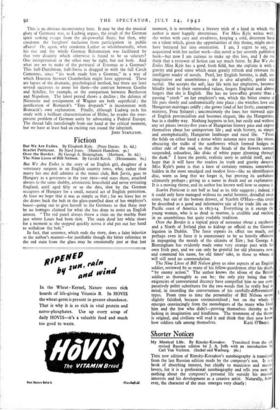Fiction
But We Are Exiles. By Elisabeth Kyle. (Peter Davies. 8s. 6d.) Scarlet Petticoat. By Nard Jones. (Hamish Hamilton. 9s.) Over the Border. By George A. Birmingham. (Methuen. 8s. 6d.) The Nine Lives of Bill Nelson. By Gerald Kersh. (Heinemann. 6s.)
But We Are Exiles is the story of an English girl, daughter of a veterinary surgeon in an English country town, who, rather than marry her one dull admirer at the tennis club, Bob Jarvis, goes to Hungary as a governess in the year 1910—and stays there, attached always to the same shabby, aristocratic household and never revisiting England, until aged fifty or so she dies, shot by the German occupiers of Hungary for a small, natural act of English patriotism. At least we hope that it was as simple as that ; for we leave her as she draws back the bolt in the glass-panelled door of her employer's house—going out to give herself to the Germans so that there may be no hostages claimed for what she has done to assist an English airman. "The red panel always threw a stain on the marble floor just where Louis had been shot. The stain dyed her white shoes for a moment as she stepped quickly across it and put out her hand to withdraw the bolt."
In fact, that sentence, which ends the story, does a faint injustice to the author's manner—for justifiable though the bitter reference to the red stain from the glass may be emotionally just at that last
moment, it is nevertheless a literary trick of a kind in which this author is most happily abstemious. For Miss Kyle writes well; she writes with care and steadiness, keeping a cold, deterrent hand on a talent which, given the opportunities of this theme, might easily have betrayed her into ostentation. I am, I regret to say, un- acquainted with her earlier work—this novel is her seventh published book—but now I am curious to make up this loss, and I do not think that a reviewer of fiction can say much fairer. In But We Are Exiles Miss Kyle has a good, fresh field, but she exploits it with a gravity and good sense which must greatly refresh and reassure the intelligent reader of novels. Pearl, her English heroine, is dull, un- imaginative and unambitious ; she is also adaptable, gentle and tactful. She accepts the soft, lazy life with her employers, becomes blindly loyal to their outmoded values, forgets England and almost forgets that she is English. She has no love-affair greater than a passing " crush " on her employer's son, which the bitter course of life puts slowly and undramatically into place ; she watches love and Hungarian marriages coldly ; she grows fond.of her lively, courageous mistress, Frau Szitanyi ; unconsciously she loses her outward signs of English provincialism and becomes elegant, like the Hungarians, but in a shabby way. Nothing happens to hcr, but easily and without any set pieces twenty-five years of Hungarian history pass and expose themselves about her unimportant life ; and with history, as simply and unemphatically, Hungarian landscape and rural life. " From the fields on either hand a dense white autumn mist rose like steam, obscuring the stalks of the sunflowers which formed hedges on either side of the road, so that the heads of the flowers seemed suspended, colourless, like disks of white paper gleaming through the dusk" I leave the gentle, realistic story to unfold itself, and I hope that it will have the readers its truth and gravity deserve. Miss Kyle's point is that a knot of certainty remains somewhere hidden in the most smudged and modest lives—like an identification disc, worn so long that we forget it, but proving its usefulness ultimately perhaps ; giving us a name in death and an explanation. It is a moving theme, and its author has known well how to expose it Scarlet Petticoat is not half as bad as its title suggests ; indeed, if it could only have managed without its awful heroine, dreadful stock sister, but out of the bottom drawer, of Scarlett O'Hara—this could be described as a good and informative tale of fur trade life on the Pacific coast of America in 1813-14. Everything in it except the young woman, who is as dead as mutton, is credible and exciting in an unambitious but quite readable tradition.
Over the Border is a topical piece of nonsense about a racehorse and a North of Ireland plan to kidnap an official at the German legation in Dublin. The farce repeats its effect too much, and perhaps even in farce it is unnecessary to be so heavily offensive in impugning the morals of the citizens of Eire ; but George A. Birmingham has evidently made some very strange pact with his own Irish past, and we can only be grateful for old pleasures now, and commend his name, for old times' sake, to those to whom it will still need no commendation.
The Nine Lives of Bill Nelson gives us nine aspects of an English soldier, reviewed by as many of his fellow-guardsmen after his death, " by enemy action." The author knows the idiom of the British soldier as thoroughly as can be: the only pity being that the exigencies of conventional decency have compelled him to use com- paratively polite substitutes for the two words that he really had in mind, in recording the conversations of his carefully-differentiated types. From time to time the personality of Bill Nelson seems slightly falsified, because sentimentalised ; but on the whole it emerges convincingly from the monologues of the many who liked him and the few who didn't—proving themselves thereby to be lacking in imagination and kindliness. The treatment of the theme is original, and civilians will read it and think that they now know
how soldiers talk among themselves. KATE O'BRIEN.


























 Previous page
Previous page